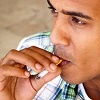
If the surface of your tongue resembles a map, you may have "geographic tongue" – a relatively harmless condition in which the sides and upper surface of the tongue have a map-like appearance.
You may also notice these patterns in various other areas of your mouth.
According to WebMD.com, geographic tongue (also called migratory glossitis or erythema migrans) is a completely benign condition that isn’t linked to infection, cancer or any other disease.
Read: Your teeth - the basics
Who gets geographic tongue?
Studies report different prevalence rates for geographic tongue, according to DrGreene.com. However, it’s estimated that about 0.1% to 14.3% of otherwise healthy people are affected.
Research also indicates that the condition is more common in women than in men, and that it tends to occur in middle-aged adults instead of children.
What are the signs of geographic tongue?
Signs of this condition include the presence of several large, red, slightly depressed and usually smooth patches on the surface of the tongue. The red areas are often bordered with distinct white bands, giving the tongue the appearance of a map.
Most people are unaware of the condition unless an oral hygienist or another health professional picks it up. However, according to WebMD.com, about one in ten people with geographic tongue may experience mild discomfort or a burning and/or painful sensation.
This is often worsened by:
• Hot, spicy or acidic foods
• Cigarette smoke
• Toothpaste
Causes and risk factors
A healthy tongue consists of a mass of muscle fibres covered by a mucous membrane, and geographic tongue occurs when parts of the tongue are missing layers of small bumps called papillae. These normally cover the entire upper layer of the tongue.
Scientists and medical professionals are still not sure why some people lack these papillae. However, geographic tongue does tend to run in families, which means genes may play a role.
Read: How clean is your mouth?
How is geographic tongue treated?
It’s important to see your dentist or doctor if you think you may have geographic tongue, as this is the best way to rule out more serious problems. Consulting a health professional is especially important if you’re experiencing severe discomfort and/or pain.
If you have geographic tongue, your doctor may prescribe:
• Over-the-counter pain relievers
• Anti-inflammatory medication
• Mouth rinses with anaesthetic
• Corticosteroids applied directly to the tongue
• Zinc supplements
Read: Keep your smile healthy
To speed up the relief of geographic tongue, it’s best to completely avoid:
• Tobacco
• Hot, spicy or acidic foods and dried, salty nuts
• Toothpaste with additives, whitening agents or heavy flavouring (toothpaste for sensitive teeth is a better choice)
Read More:
How to cure bad breath
Smoking and Oral Health
Your oral health affects your child
Image: Geographic tongue from Shutterstock
Written by: Marvin Borcherds




 Publications
Publications
 Partners
Partners















